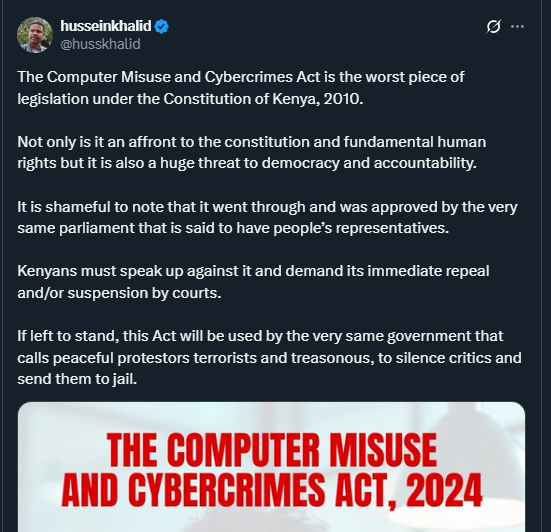Hussein Khalid Slams Cybercrimes Act as Kenya’s Worst Law Under 2010 Constitution

Human rights activist Hussein Khalid has strongly condemned the Computer Misuse and Cybercrimes (Amendment) Act, 2024, describing it as the most dangerous and unconstitutional law passed under Kenya’s 2010 Constitution. Speaking on Wednesday, October 22, 2025, Khalid warned that the new law undermines human rights, weakens democracy, and hands the government unchecked power to suppress dissent.
Khalid said the legislation represents a betrayal of Kenya’s democratic values, accusing Parliament of approving a law that directly targets free speech. “The Computer Misuse and Cybercrimes Act is the worst piece of legislation under the Constitution of Kenya, 2010. Not only is it an affront to the constitution and fundamental human rights, but it is also a huge threat to democracy and accountability,” he said. He further criticised lawmakers, stating, “It is shameful to note that it went through and was approved by the very same Parliament that is said to have people’s representatives.”

Why Is the Cybercrimes Act Sparking Public Outrage?
According to Khalid, the new law gives the government excessive power to monitor and punish citizens who express dissent online. “Kenyans must speak up against it and demand its immediate repeal and/or suspension by the courts,” he urged. “If left to stand, this Act will be used by the very same government that calls peaceful protestors terrorists and treasonous, to silence critics and send them to jail.”
President William Ruto signed the Computer Misuse and Cybercrimes (Amendment) Act, 2024 into law on October 15, 2025, despite widespread criticism from civil society and digital rights advocates. The new version expands Section 27 of the Act, which deals with cyber harassment, introducing tougher penalties and broader definitions that critics say can easily be abused.
Under the amendment, any online content, whether a tweet, post, video, meme, or comment, that causes what authorities deem “serious emotional distress” or could push someone to contemplate suicide, qualifies as cyber harassment. Offenders risk hefty fines or imprisonment, even if the post was made under an anonymous account.
What Powers Does the Law Give Authorities?
The law also empowers the National Computer and Cybercrimes Coordination Committee (NCCCC) to take unprecedented action against digital platforms. The committee can now block any website, app, or page in Kenya without first obtaining a court order. Police can use the committee’s directive as evidence to arrest suspects, even before the matter is presented in court.
Digital rights advocates have warned that such provisions open the door to government censorship and the criminalisation of online expression. Khalid’s statement reflects a growing movement among activists calling for the law’s immediate repeal, arguing that it erodes the very freedoms Kenya’s 2010 Constitution was meant to protect.
By Lucky Anyanje










